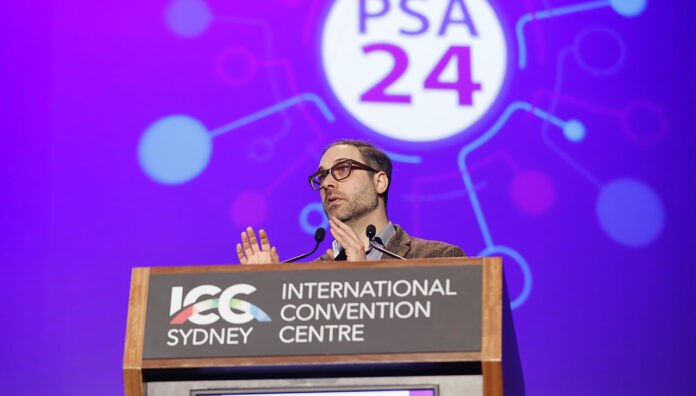This is how patients should go off all psychiatric drugs – Australian Pharmacist

About 3.5 million people use antidepressants in Australia, on average every 4 years. This makes Australia one of the highest users of antidepressants among the Organization’s countries. for Economic Co-operation and Development (OECD), said Dr Mark Horowitz at the conference “Maudsley Deprescribing Guidelines approach – the science of prescribing psychiatric drugs,” on PSA24 today. 3 August).
Dr. Horowitz nearly died from severe withdrawal effects, prompting him to develop Maudsley Deprescribing Guidelines due to the lack of evidence-based guidelines for deprescribing depression.
The overuse of antidepressants in Australia makes these new guidelines a very important tool.
He said: ‘Women are given more antidepressants than men. ‘Adults are ordered [antidepressants] more than young people, and in poor areas, ordering has also increased.’
Although the Therapeutic Guidelines says that ‘withdrawal symptoms’ from antidepressants are usually mild and last 1-2 weeks, this definition is based on short-term trials conducted by drug companies. drugs in the 1990s and 2000s.
However, after using an antidepressant for 8-12 weeks, most people have mild and short-term withdrawal symptoms, said Dr. Horowitz. The longer people use antidepressants, the harder it is to stop.’
What happens when people stop taking antidepressants?
In studies of patients who have had long-term antidepressants, changes in the serotonin system can be seen up to 4 years after they stop, said Dr Horowitz.
So what you have is the body’s levels of serotonin [and] down-regulated serotonin receptors,” he said. “In general, you have decreased serotonin signaling in the system, [which is] something like hypo-serotonin syndrome.’
When patients have symptoms that last for several weeks, months, or longer after stopping, doctors will often say that it cannot be caused by the drug they just stopped. .
‘[But] the more you tolerate the drug, the more likely you are to get off it [symptoms],’ said Dr. Horowitz. So even though people sometimes claim that antidepressants don’t cause tolerance, they clearly do.’
There is a ‘long list’ of withdrawal symptoms that affect many different body systems, including dizziness, headaches, lack of concentration, depressed mood, irritability , anxiety, panic attacks, electrocution, cerebral palsy and suicide.
‘We know these are withdrawal symptoms because they are also seen in people who are prescribed antidepressants for reasons other than mental health problems. [including] he said.
Akathisia can also occur, which is known as a long-term effect of antipsychotic use, but it can also occur when antidepressants, benzodiazepines and other psychotropic drugs are stopped quickly.
‘[People] they are often fast-paced, restless and full of fear, and are at high risk of suicide,’ he said. ‘These people turn to emergency departments. And because people don’t know that akathisia is a withdrawal effect, they are [sometimes] he was diagnosed with psychosis, and given an inappropriate set of drugs to treat mental illnesses that may not be helpful.’
One study found that about half of patients who stop antidepressants have withdrawal effects, and about half of those report that withdrawal effects are severe.
“So that’s about one in four people who have severe symptoms,” Dr. Horowitz said.
How should tapering be approached?
The GOOD GUIDELINES developed by the Royal College of Psychiatrists in the United Kingdom, published a few years ago, provides broad principles on how to stop these medications, said Dr Horowitz.
People who take these drugs for more than a few weeks should taper off after months or years [and] go down to very small doses before stopping, sometimes less than 1 mg, and then go down with smaller and smaller doses,’ he said. ‘The rate should be adjusted to the individual’s ability to withstand the action.’
The logical approach is to reduce the dose in a way that minimizes the effect on the brain. This method, called hyperbolic tapering, is presented in the Maudsley Deprescribing Guidelines.
‘There are various licensing options, [including] cutting boards. Escitalopram too it comes as a liquid in Australia,” said Dr Horowitz. ‘There are also off-label options, such as compounding pharmacies that can make capsules, pills or liquids.’
Some people try taking antidepressants every other day to try to get smaller doses. But since most antidepressants have a half-life of 24 hours or less, this can sometimes lead to severe withdrawal effects.
‘Switching to fluoxetine is often recommended…. has a long half-life, [but] it’s not a stupid way to do it,’ he added.
What about other psychiatric medications?
The recommended mechanism for reducing stress is true for psychiatric drugs in general, said Dr. Horowitz.
‘Opioids, benzodiazepines and Z drugs should be reduced in smaller and smaller doses,’ he said. This is because they have exactly the same mechanism of effect on the brain.’
With diazepam, reducing from 1 mg to zero produces a greater change in the brain than from 100 mg to 75 mg.
“The last few milligrams are the hardest to stop,” Dr. Horowitz said. ‘For all psychiatric drugs, going down in smaller and smaller doses – being very careful at the end, and using things like liquids or combined tablets – can help. [patients get] get rid of all these different drugs.’
Hear more from Dr. Mark Horowitz in PSA’s live webinar The Maudsley Deprescribing approach – the science of prescribing on August 8, 2024.
#patients #psychiatric #drugs #Australian #Pharmacist